NCERT Solutions for Class 6 Science Chapter 6 Changes Around Us
Topics and Sub Topics in Class 6 Science Chapter 6 Changes Around Us
| Section Name | Topic Name |
| 6 | Changes Around us |
| 6.1 | Can all changes always be reversed? |
| 6.2 | Could there be other ways to bring a change? |
Class 6 Science Chapter 6 Textbook Questions Solved
1. To walk through a waterlogged area, you usually shorten the length of your dress by folding it. Can this change be reversed?
Ans: Yes, it can be reversed by unfolding the dress.
2. You accidentally dropped your favourite toy and broke it. This is a change you did not want. Can this change be reversed?
Ans: No, this change (breaking of toy) cannot be reversed.
3. Some changes are listed in the following table. For each change, write in the blank column, whether the change can be reversed or not.
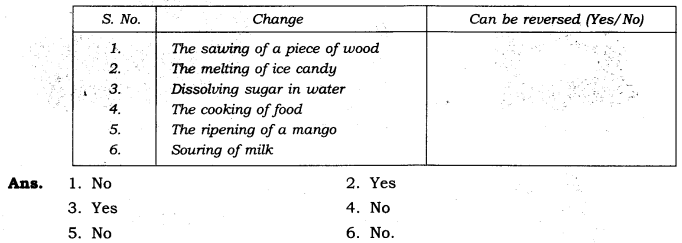
4. A drawing sheet changes when you draw a picture on it. Can you reverse this change?
Ans: No, we cannot get fresh drawing sheet once a picture is drawn on it with paint/ oil or water. However, we can reverse the change, if soft pencil is used to draw the picture.
5. Give examples to explain the difference between changes that can or cannot be reversed.
Ans: Examples of reversible and irreversible changes
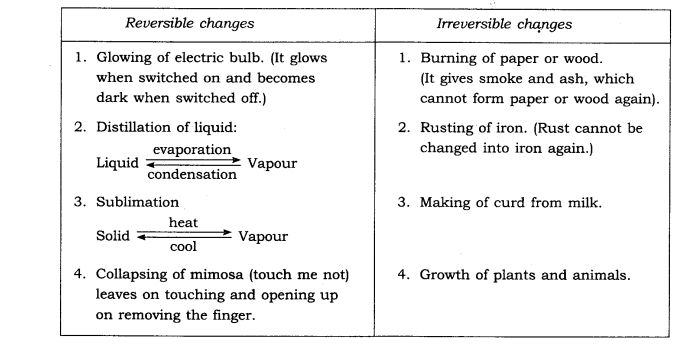
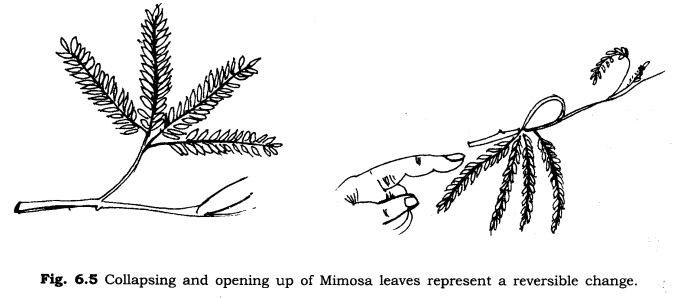
6. A thick coating of a paste of Plaster of Paris (POP) is applied over the bandage on a fractured bone. It becomes hard on drying to keep the fractured bone immobilised. Can the change in POP be reversed?
Ans: No, the change in POP cannot be reversed since it is a chemical change.
7. A bag of cement lying in the open gets wet due to rain during the night. The next day the sun shines brightly. Do you think the changes, which have occurred in the cement, could be reversed?
Ans. No, these are irreversible chemical changes.
EXTRA QUESTIONS for Class 6 Science Chapter 6
Class 6 Science Chapter 6 VERY SHORT ANSWER TYPE QUESTIONS
1. Give two examples of slow changes.
Ans:
(a) Growing of plants
(b) Ripening of fruits.
2. Give two examples of fast changes.
Ans:
(a) Blowing of balloon
(b) Rolling out roti from dough ball.
3. Give two examples of reversible changes.
Ans:
(a) Drying of wet clothes
(b) Heating of milk.
4: Give two examples of irreversible changes.
Ans:
(a) Milk to cheese
(b) Cooking of food.
5. Can you say deforestation is an irreversible or reversible change?
Ans: It is an irreversible change.
6. Does the size of the paper change after making an aeroplane by folding it or by cutting it?
Ans: Yes.
7. Can you change the shape of a eraser after erasing?
Ans: Yes.
8. Why does a blacksmith heat the metal rim to fix it on a cart wheel?
Ans: A blacksmith heats the metal rim to fix it onto a cart wheel because a metal rim is made slightly smaller. On heating, the rim expands and fits onto the wheel. Then on cooling, the rim contracts and fits tightly onto the wheel.
9. What are slow and fast changes? Give examples.
Ans: The changes which take place in a long period of time are called slow changes whereas that changes which take place in a short period of time are called fast changes.
Examples:
(a) Rusting of iron, formation of day and night, ripening of fruits, growing of trees are slow changes.
(b) Burning of paper, stretching of rubber band, blowing of balloons, bursting of crackers are fast changes.
10. Classify the following into slow and fast changes:
(i) Spinning of top
(ii) Formation of day and night
(iii) Formation of curd from milk
(iv) Change of season
(v) Making curd from milk by adding lemon juice.
Ans:
(i) Fast change
(ii) Slow change
(iii) Slow change
(iv) Slow change
(v) Fast change.
11. Classify the following as slow or fast change:
(i) Bearing of heart
(ii) Change of seasons
(iii) Burning of paper
(iv) Weathering of rocks
(v) Melting of wax
(vi) Cooking of food
(vii) Burning of wax
(viii) Melting of ice cream
(ix) Curding of milk
(x) Formation of day and night
Ans:
(i) Fast
(ii) Slow
(iii) Fast
(iv) Slow
(v) Fast
(vi) Slow
(vii) Fast
(viii) Fast
(ix) Slow
(x) Slow
12. Write some changes happening in our body.
Ans:
(a) Our nails grow
(b) Our hair grows
(c) We grow taller
(d) Our weight increases.
13. Some common changes are given in Table 6.1. Which of these changes do you think can be reversed?
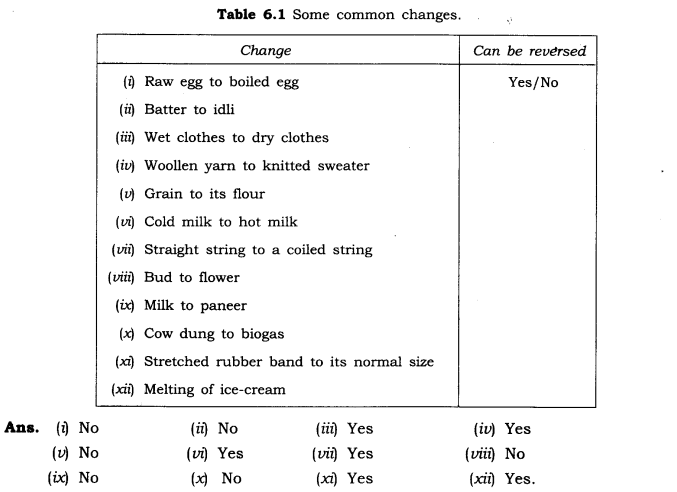
Class 6 Science Chapter 6 SHORT ANSWER TYPE QUESTIONS
1. What is a physical change? Explain with example.
Ans: The changes in which only physical properties of substances are changed and no new substance is formed is called physical change. It is a reversible change. Example: Boiling and freezing of water.

2. What is a chemical change? Explain with example.
Ans: The changes in which new substance with new chemical properties are formed are called chemical changes.
Example: Reaction between washing soda and lemon juice in which C02 and other substances are formed.
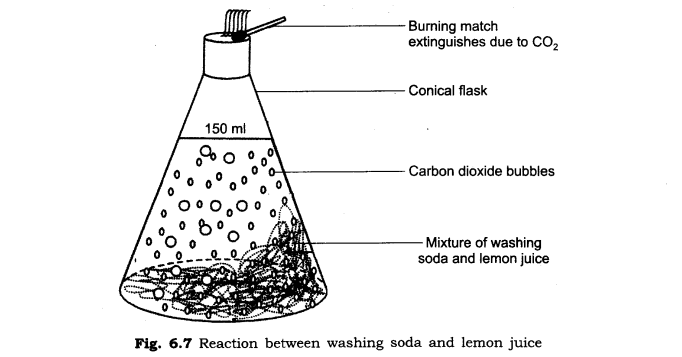
3. What happens when sugar is heated?
Ans: When sugar is heated continuously then a black powdery substance is formed. This is a chemical change.
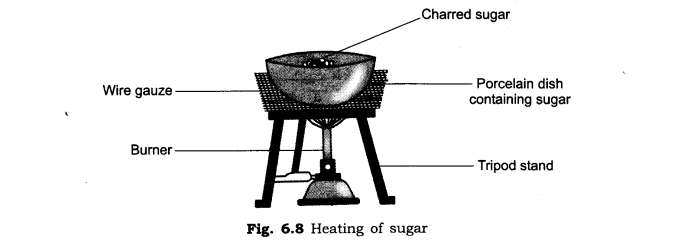
Class 6 Science Chapter 6 LONG ANSWER TYPE QUESTIONS
1. Explain how a metal rim slightly smaller than a wooden wheel can be fixed on it.
Ans: The metal rim is always made slightly smaller than the wooden wheel. The metal rim is heated. On heating, the rim expands and fit onto the wheel. Cold water is then poured over the rim. Due to cooling the metal rim contracts and fits tightly onto the wheel.
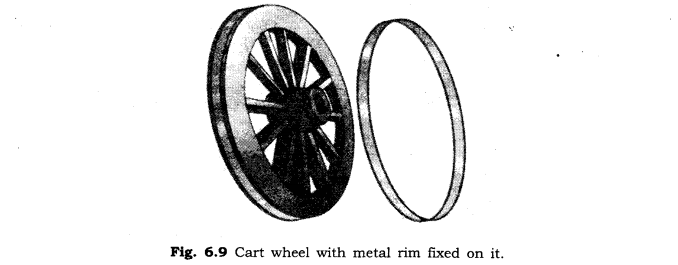
2. How does curd being set? Is this change reversible?
Ans: A small quantity of curd is added to warm milk. The milk is stirred and is set aside undisturbed for a few hours at a warm place. In a few hours, the milk changes into curd.
Curd formed from milk cannot be changed into milk again. So, this an irreversible (cannot be reversed) change.
NCERT Solutions for Class 6 Science – All Chapters
- Chapter 1 Food Where Does It Come From
- Chapter 2 Components of Food
- Chapter 3 Fibre to Fabric
- Chapter 4 Sorting Materials Into Groups
- Chapter 5 Separation of Substances
- Chapter 6 Changes Around Us
- Chapter 7 Getting to Know Plants
- Chapter 8 Body Movements
- Chapter 9 The Living Organisms and Their Surroundings
- Chapter 10 Motion and Measurement of Distances
- Chapter 11 Light Shadows and Reflection
- Chapter 12 Electricity and Circuits
- Chapter 13 Fun with Magnets
- Chapter 14 Water
- Chapter 15 Air Around Us
- Chapter 16 Garbage In Garbage Out